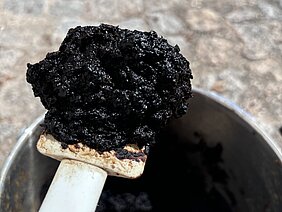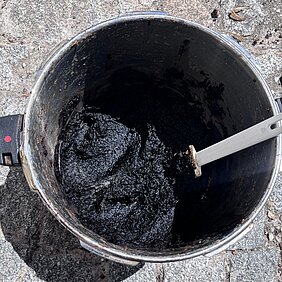Peat is an all-rounder and is used in growing media to improve soils. In order to be able to extract natural peat, peatlands have to be drained - with devastating effects on the ecosystem. The Leibniz Institute for Agricultural Engineering and Bioeconomy (ATB) has now filed two patents for innovative technologies for the quick and scalable production of artificial peat. The sustainable alternative to natural peat can be produced within minutes instead of millennia.
Peat is a type of humus. It is formed naturally from organic materials that are incompletely decomposed in water-saturated peatlands due to the lack of oxygen. Over the millennia, thick layers of peat are formed. Peat is mined and utilised worldwide, in particular because of its soil-improving properties.
The new processes submitted for patenting produce peat artificially with properties that correspond to natural peat - in just 30 minutes and in a way that is easily scalable. Dr Nader Marzban, inventor and scientist at ATB, explains: “We can produce artificial peat from almost any organic source material, including biomass such as wood, grasses, leaves, and paludiculture plants. This process requires the presence of water, applied pressure, and temperatures between 70 and 120 °C, along with an appropriate formulation or recipe for successful production.”
From Pressure Cooker to Patent
The idea emerged from a simple observation during everyday life. “I often think of cooking as chemical engineering,” says Dr Marzban. “Mass transport, reactions, gradients and heat transfer - even the mixing of ingredients - are all part of transport phenomena, which were also the focus of my doctoral thesis. One evening, while cooking vegetables, beans, and meat, the water in my pressure cooker evaporated and the food burned. I looked at the black-brown residue left behind and thought: ‘Could this partially carbonised material have humic-like properties?’”
Back in the lab, Dr Marzban analysed the material and found that it did indeed resemble humic substances - with organic fibres still intact. He repeated the experiment with various agricultural residues, biomass and mild chemical additives. The results were astonishing: he had synthesised artificial peat under low-pressure conditions and thus imitated natural peat formation, which normally takes thousands of years, in just a few minutes.
Simple Methods, Scalable Production
With the support of his colleagues and co-inventors, Dr Thomas Hoffmann and Dr Ralf Pecenka, both long-standing experts with extensive experience and several pilot projects in fibre production, as well as the unique research infrastructure and expertise at ATB, Dr Marzban further developed the approach. He successfully scaled it up from small laboratory batches to a continuously working process with a huge potential for larger amount of peat like substrate per day. The result is two processes that are as simple as they are groundbreaking:
The first application Method for the Continuous Production of Artificial Peat by Alkaline-Assisted Twin-Screw Extrusion produces a stable, humus-rich material whose properties can be customised to match or even surpass those of natural peat. The process is particularly suitable for agricultural or horticultural applications where both long and short fibre components are required, as well as humic substances, are desired. In the two-stage process, the biomass is first cooked at around 70 °C under pressure. A twin-screw extruder then breaks down the material’s fibres, and the mechanical forces generate exothermic reactions that promote the formation of peat-like humic structures.
The second application Method for the Rapid Batch Conversion of Biomass into Artificial Peat requires only one step. It is suitable for less fibrous materials and works at a slightly higher temperature of around 120 °C.
Climate-positive, Pathogen-free and Re-peatable
The artificial peat is an effective and – due to the temperatures, and recipe for production in the process – pathogen-free growth medium. It is climate-positive, i.e. it binds large amounts of carbon. Even after one use in pot trials, the substrate can be recycled, partially decomposed, and reprocessed into new disinfected peat material – a concept that Dr Marzban calls RePeat.
Foundation of a New Research Field
“Artificial peat combines the art of chemistry with engineering,” says Dr Marzban. “It offers a way to replace natural peat, reduce emissions, and recycle biomass, turning a domestic accident into a global solution. With these two processes, we have laid the foundation for further research and for the development of an emerging scientific field that could soon reach industrial production due to its scalability and low costs. The concept of artificial peat, however, is only the beginning, an exciting starting point for continuous refinement, adaptation, and innovation. This reflects a process philosophy, a seed that has now been planted, which we hope will continue to grow through collective scientific effort. In this regard, a scientific paper detailing the processes and the characterisation of artificial peat is currently under review and is expected to be published soon, providing a basis for the vast research potential that lies ahead,” concludes Dr. Marzban.
As a pioneer and driver of systemic-technological bioeconomy research, ATB places particular emphasis on integrated residue management. The two new processes expand the portfolio of biomass utilisation from by-product and waste streams with a valuable technology that not only creates new value but also effectively closes bioeconomic cycles. In this way, ATB is laying further foundations for the transformation of agricultural and industrial systems into a sustainable bio-based circular economy.
Contact
Dr Nader Marzban
Scientist for Thermochemical Conversion, ATB
Telefon: +49 331 5699-339
E-Mail: nmarzban@atb-potsdam.de
Jessica Lietze
Officer for Public Relations, ATB
Telefon: +49 331 5699-819
E-Mail: presse@atb-potsdam.de


